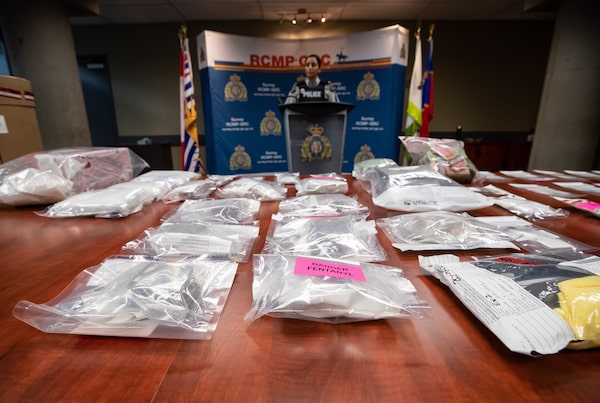
RCMP Cpl. Joanie Sidhu speaks about a seizure of illegal drugs, cash and a firearm during a news conference in Surrey, B.C., on Thursday, Sept. 3, 2020.DARRYL DYCK/The Canadian Press
On Wednesday morning, the BC Coroners Service issued its latest grim news: Illicit drug toxicity killed 162 people in October in British Columbia.
It had been another brutal month, and one that again saw a spike in deaths involving “extreme fentanyl concentrations.” The death toll this year in B.C. is now 1,386, and likely to exceed the record deaths of 1,549 in 2018. The ravages of Canada’s other epidemic, too often invisible to most people, are especially stark when measured against COVID-19, the disease that has killed 384 people in the province.
On Wednesday night, Vancouver City Council voted to back Mayor Kennedy Stewart’s plan to seek a special exemption from the federal government to decriminalize the possession of small amounts of drugs for personal use.
Decriminalization is not legalization, as was the case for cannabis. Drugs such as heroin and cocaine will not be available for legal sale.
What decriminalization means is recognizing substance-use disorders as, first and foremost, a public-health issue. Addiction is not something that can ever be solved, and is often worsened by, the criminal justice system.
This year, overdose deaths have soared in B.C. and across Canada, as the pandemic and its restrictions have squeezed vulnerable Canadians. The drug supply is more dangerous, access to services is limited and people are more isolated. Ontario, like B.C., is expected to see a record count of deaths this year – more than 2,200 people.
The national death toll, over the past five years, is approaching 19,000.
As Canada’s opioids epidemic hits deadly new highs, support for decriminalization has broadly coalesced this year. It began years back with grassroots groups, then with public-health officials and, more recently, with political leaders.
In July, the Canadian Association of Chiefs of Police backed decriminalization after accepting substance misuse as a public-health issue. Arresting people, the chiefs said, “has proven to be ineffective.” In August, the Public Prosecution Service of Canada put out new guidelines that said most people caught with small amounts of drugs should not be wrung through the courts, a path that has “limited effectiveness.”
Decriminalization is not some magic solution that will instantly make addiction vanish. It is, however, a key pillar of harm-reduction policies.
Other measures include access to a safe supply of clean drugs, to address the deadly toxicity of street drugs, a policy B.C. has pushed ahead this year. Measures from previous years, such as supervised-injection sites and overdose prevention kits, have proved effective and saved lives.
More broadly, harm reduction – keeping people alive – can lead drug users into social services, treatment and housing.
Vancouver plans to seek what is called a “Section 56 exemption” under the federal Controlled Drugs and Substances Act. Ottawa has broad latitude to act if there is a “medical or scientific purpose or is otherwise in the public interest.” Similar exemptions have been used for supervised-injection sites and safe-supply programs.
Ottawa had been resistant to decriminalization. Last year, the Conservatives falsely accused the Liberals of planning to “legalize hard drugs.” But there has been a shift. Health Minister Patty Hajdu in August urged all provinces to implement a safe supply of drugs, after Ottawa opened up the avenue.
Last week, when Mr. Stewart in Vancouver announced his plan, Ms. Hajdu said she was working with the city and province to respond to local needs, and added she had taken heed of the chiefs of police and the Public Prosecution Service.
This is the weighing of, and being guided by, evidence. Decriminalization of drugs may still sound radical to some. Previous policies in their early days, such as supervised-injection sites, were greeted the same way. But the evidence is clear. In one study, in the journal Addiction, harm-reduction measures saved an estimated 3,030 lives in B.C. over 18 months, from April, 2016, through December, 2017.
The reluctance to act among elected officials has gone on too long. It has meant people were jailed for what has always been a health issue. It has meant people died when it did not have to turn out that way.
The prospect of decriminalization – and pledges to open up a safe supply – are not so much a good news story as making a bad news story less bad. Canadian leaders have not been bold enough. That may be finally changing.
Keep your Opinions sharp and informed. Get the Opinion newsletter. Sign up today.